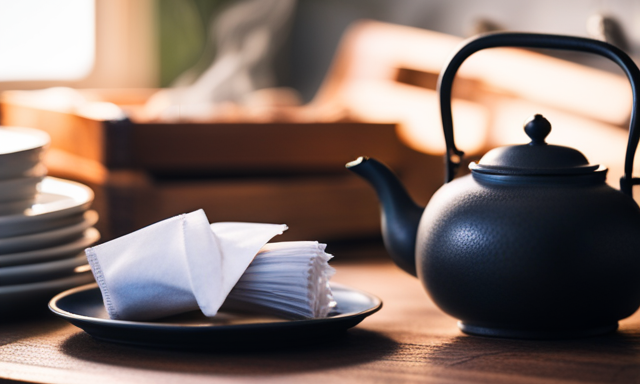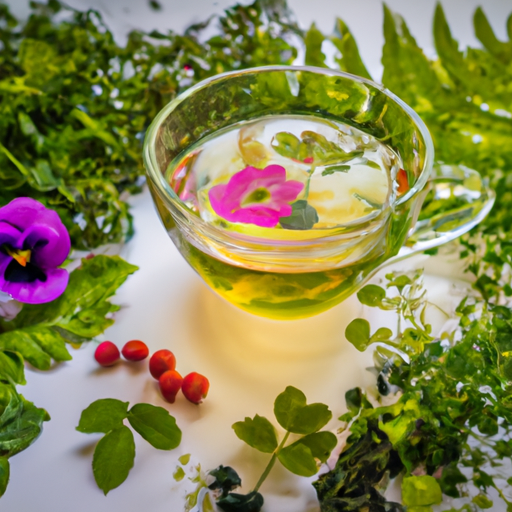Did you know that herbal teas are the second most commonly used complementary therapy worldwide? In fact, a recent survey revealed that 48% of Americans regularly consume herbal teas for various health benefits. However, you may be surprised to learn that doctors often advise against the use of herbal teas. Why is that? Are they really as harmless as they seem?
In this article, we will explore the reasons why doctors caution against the consumption of herbal teas. From potential interactions with medications to the lack of scientific evidence, there are several factors to consider.
Additionally, the lack of standardization and regulation, as well as the possibility of allergic reactions and contamination, raise concerns about the safety of these teas.
It is important to note that while herbal teas may have some health benefits, they should not be considered a substitute for medical advice or treatment. By understanding the reasons behind doctors’ recommendations, we can make informed decisions about our health and well-being.
So, let’s delve into the world of herbal teas and explore the reasons why doctors may advise against their consumption.
Key Takeaways
- Doctors often advise against the use of herbal teas due to potential interactions with medications.
- Lack of standardization and regulation in the herbal tea industry is a concern.
- Allergic reactions can occur when consuming herbal teas.
- Limited research and scientific evidence regarding the efficacy of herbal teas is a concern.
Potential Interactions with Medications
Doctors may advise against consuming herbal tea due to possible interactions with medications. While herbal tea is generally considered safe and can have various health benefits, it’s important to be aware of potential side effects and drug interactions.
Some herbal teas contain compounds that may interfere with the effectiveness of certain medications, leading to decreased drug effectiveness or increased side effects. For example, herbal teas such as St. John’s wort, ginkgo biloba, and chamomile have been found to interact with medications used to treat depression, blood thinners, and sedatives, respectively. These interactions can be dangerous and may compromise the efficacy of prescribed medications.
Therefore, it’s crucial to consult with a healthcare professional before consuming herbal teas, especially if you’re taking any medications. Additionally, another reason doctors may caution against herbal teas is the lack of standardization and regulation in the herbal tea industry. This lack of oversight can lead to inconsistent potency and quality, making it difficult to predict the effects of herbal teas on medications.
This lack of standardization and regulation further emphasizes the importance of seeking professional advice.
Lack of Standardization and Regulation
Amidst the vast array of herbal potions, the absence of standardized regulations leaves you wandering through an uncharted forest of uncertainty. The lack of quality control and inconsistent dosages in herbal teas make it difficult for doctors to recommend them. Unlike prescription medications, herbal teas do not undergo rigorous testing and regulation to ensure their safety and efficacy. This means that the potency and composition of herbal teas can vary greatly from one product to another, making it challenging for healthcare professionals to accurately assess their potential benefits or risks. Without standardized regulations, doctors are unable to confidently endorse herbal teas as a treatment option. As we delve into the next section about allergic reactions, it becomes apparent that the unpredictable nature of herbal teas can have serious consequences for some individuals.
Allergic Reactions
Navigating the world of herbal teas without standardized regulations can lead to uncertain consequences, especially when it comes to allergic reactions. Herbal tea alternatives and natural remedies may seem like a safe and healthy option, but without proper regulation, it’s difficult to determine the exact ingredients and potential allergens in these products.
Allergic reactions to herbal teas can range from mild symptoms like itching and hives to more severe reactions such as difficulty breathing and anaphylaxis. It’s important to be aware of the potential risks and consult with a healthcare professional before incorporating herbal teas into your routine, especially if you have a history of allergies.
Moving forward, it’s essential to consider the issue of contamination and pesticide use in herbal teas to ensure the safety and efficacy of these products.
Contamination and Pesticide Use
To ensure the safety of your herbal tea, be mindful of contamination and pesticide use, which have been found to affect nearly 70% of herbal tea products on the market. Contamination can occur during the cultivation, harvesting, and processing of herbs, leading to the presence of harmful substances like heavy metals, pesticides, and microbial contaminants.
Pesticide use in herb cultivation can have detrimental effects on both the environment and human health. It is important to choose herbal tea brands that prioritize environmental impact, sustainability, and sourcing practices. Look for companies that use organic farming methods and conduct regular testing for contaminants. By doing so, you can support brands that prioritize consumer safety and the health of our planet.
Transitioning into the next section, it is important to note that despite these concerns, the lack of scientific evidence regarding the efficacy of herbal tea is another factor to consider.
Lack of Scientific Evidence
Unfortunately, the lack of scientific evidence leaves us uncertain about the true benefits of herbal tea. While herbal tea has been consumed for centuries and is often touted for its health benefits, there is a lack of clinical trials and limited research to support these claims. Without rigorous scientific studies, it is difficult to determine the specific effects of herbal tea on our health.
Although some individual studies suggest potential benefits, it is important to note that these findings are often preliminary and not yet conclusive. Therefore, doctors may advise against herbal tea because they prioritize evidence-based medicine. Moving forward, it’s crucial to conduct more research to better understand the potential benefits and risks of herbal tea. This will help provide patients with more accurate information and enable healthcare providers to make informed recommendations.
Transitioning into the next section, the limited research also raises concerns about the potential for mislabeling of herbal tea products.
Potential for Mislabeling
While the lack of scientific evidence is a valid concern when it comes to herbal tea, another important factor to consider is the potential for mislabeling. Herbal teas are not regulated by the Food and Drug Administration (FDA) in the same way that medications are, which means there’s a greater risk of misinformation and inaccurate labeling.
Without proper quality control measures in place, it’s difficult to determine the exact ingredients and concentrations in herbal teas. This can be problematic, especially for individuals with specific health conditions, as certain herbs may interact with medications or worsen existing health issues.
Therefore, it’s important to consult with a healthcare professional before incorporating herbal teas into your routine. They can provide personalized guidance based on your individual health conditions.
Individual Health Conditions
Additionally, it’s crucial to consider your personal health conditions when incorporating herbal teas into your routine, as they can have varying effects on individuals. Herbal teas may interact with certain medications or exacerbate existing health issues.
For instance, if you have dietary restrictions such as being on a low-sodium diet, certain herbal teas may contain high levels of sodium that can be harmful to your health. Similarly, if you have personal preferences for certain flavors or ingredients, it’s important to read the labels carefully to ensure that the herbal tea aligns with your preferences.
It’s always recommended to consult with your doctor or a healthcare professional before adding herbal teas to your routine, especially if you have any pre-existing health conditions or concerns. They can provide personalized advice based on your individual health needs.
Frequently Asked Questions
Are there any potential interactions between herbal teas and over-the-counter medications?
Potential side effects and interactions between herbal teas and over-the-counter medications exist. It is important to consult with a healthcare professional to understand the specific risks and potential complications associated with combining these substances.
How are herbal teas regulated and standardized to ensure safety and efficacy?
Herbal teas are regulated and standardized to ensure safety and efficacy. Regulatory standards set by health authorities ensure that herbal teas meet quality criteria, undergo testing for potential contaminants, and contain accurate labeling information. Safety concerns are addressed through these regulations.
Can consuming herbal teas cause allergic reactions in some individuals?
Yes, consuming herbal teas can cause allergic reactions in some individuals. For instance, a woman experienced hives, itching, and difficulty breathing after drinking chamomile tea due to an allergic reaction to chamomile. It is important to be aware of potential herbal tea allergies and reactions.
Is there a risk of contamination or pesticide use in the production of herbal teas?
There is a contamination risk and potential pesticide use in the production of herbal teas. It is important to be cautious and choose reputable brands that prioritize quality and safety.
What are the implications of the lack of scientific evidence supporting the health claims of herbal teas?
The lack of scientific evidence supporting health claims of herbal teas has implications on consumer understanding and decision-making. Additionally, the lack of regulation in the herbal tea industry raises concerns about product safety and quality.
Conclusion
In conclusion, while herbal tea may seem like a natural and harmless remedy, there are several reasons why doctors may advise against its consumption.
The potential interactions with medications, lack of standardization and regulation, allergic reactions, contamination and pesticide use, lack of scientific evidence, and potential for mislabeling all contribute to the cautious approach towards herbal tea.
It is important to prioritize evidence-based treatments and consult with healthcare professionals to ensure the best outcome for our health. Just as a ship needs a sturdy anchor to weather the storm, our bodies require reliable and proven methods to navigate the complexities of our health.










